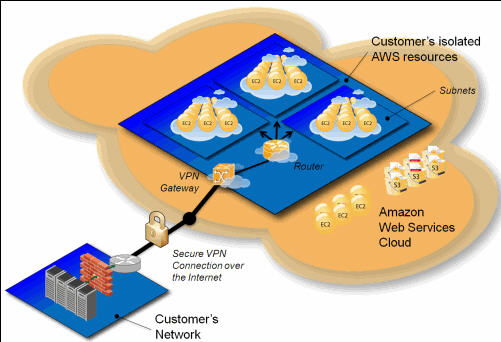Amazon Web Services rolls out Virtual Private Cloud: Enterprise customer tipping point on deck?

Amazon Web Services on Wednesday launched Amazon Virtual Private Cloud, a secure bridge designed to connect enterprise data centers with its cloud. The move fills in a big missing enterprise-friendly piece for Amazon Web Services and may ease the migration to the cloud.
Amazon diagrams the service in a blog post:
The Virtual Private Cloud (VPC) effort is notable because Amazon Web Services has become much more enterprise friendly over the last two years with reserved EC2 instances, longer-term deals and volume pricing, service level agreements and partnerships with big enterprise software vendors such as IBM, Oracle, BMC and Red Hat. However, Amazon's enterprise cloud services to date have been missing a key element: The realization that cloud computing will be a hybrid affair.
So-called "private clouds" are a glorified category that roughly equates to your plain old data center. Enter the VPC rollout. VPCs are basically virtual private network tunnels that corporations can use to tie their data centers with Amazon's cloud services. With VPC, Amazon says you can extend security services, firewalls and intrusion detection systems to their cloud.
Simply put, no company is going to toss years of data center investments---not to mention all of the management software and best practices that go with them---to go entirely cloud. Rackspace has been pitching the hybrid cloud as are many vendors. Cloud computing players can select two avenues:
- Scoff at the hybrid approach and tout that you're pure cloud;
- Or recognize the hybrid reality and woo enterprise customers.
Guess which approach will get you more corporate customers?
Adam Selipsky, vice president for product management and developer relations at AWS, noted that virtual private clouds was the most popular feature request from enterprise customers. VPC has been in a private beta with companies like Intuit and Eli Lilly. According to Selipsky, the VPC program, which is currently entering a limited beta, do the following:
- Offer a secure VPN bridge between an enterprise's existing infrastructure and AWS;
- Treat EC2 as just another resource;
- Allow customers to specify an IP address range of their choosing;
- Examine cloud traffic with existing security and network technology;
- Manage EC2 with a customer's management software from the likes of CA, Citrix and others.
Selipsky said the VPC approach will be added to all Amazon Web Services over time.
VPC will give enterprises more leeway to moving sensitive workloads to the cloud seamlessly and securely. For instance, a pharmaceutical company can move research into the cloud and a financial services firm could use its trading algorithms there.
Also see: BMC to link up with Amazon Web Services for hybrid cloud deployments
- Comparing infrastructure as a service providers: Amazon, Rackspace emerge
- Rackspace lays out its cloud computing roadmap: Think hybrid
- Amazon tweaks EC2 pricing; Takes next step in its enterprise evolution
"For a lot of CIOs CTOs and IT managers, this (VPCs) was the top feature request. They have a tremendous investment and familiarity with their own infrastructure, but want to run important workloads in the cloud in a seamless fashion," said Selipsky. The lack of private cloud support "is one of the biggest reasons why some companies have not adopted the cloud."
Amazon's goal with its Web Services unit is to consistently remove enterprise excuses to stay away from the cloud.
Separately, Amazon said it would support multi-factor authentication, which requires additional information for access. With AWS multi-factor authentication enabled, users must provide a a six-digit, rotating code from a device in their physical possession as well as their standard AWS account credentials to change settings. The enhanced authentication will be an option for customers in coming weeks, said Amazon. The company also said that it will be able to link multiple billing accounts in AWS.
More: 10 things you still have to worry about until cloud computing becomes reality
